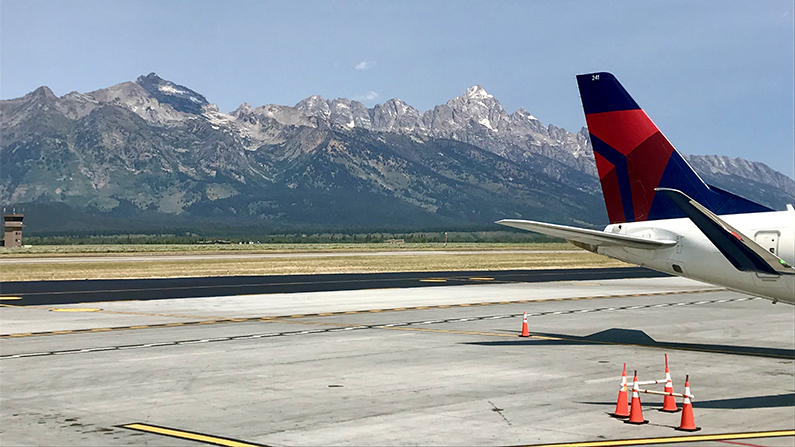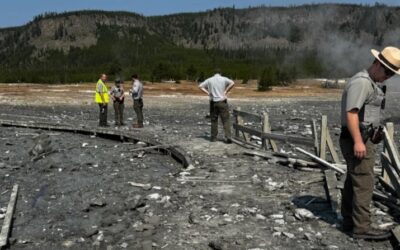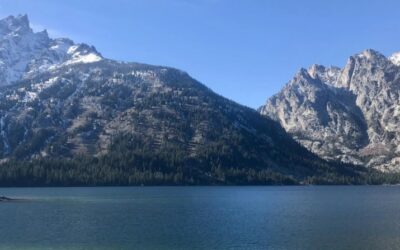Executive Director of the Jackson Hole Airport Jim Elwood didn’t waste any time at the start of an April 20 airport board meeting to break the news: Wind River Air would not be renewing its license agreement with the airport. He was also clear about what exactly that means.
“I think it’s really important for all those that are interested in this subject to recognize that Wind River Air can continue to operate as a transient operation here at the airport and can pick up and drop off passengers,” Elwood said. “They just can’t promote it as being to the extent as they currently are on their website and other places.”
Basically, Wind River Air can’t say its operation is based at the Jackson Hole Airport. The company also appears to have removed some pictures of its red Robinson 44 Raven 2 helicopter on the airport tarmac from its website. In return, Wind River Air no longer has to submit a monthly report to the airport detailing the dates and times of its scenic flights.
Asked whether that puts the board in a worse position than before in terms of monitoring the company’s activities, Elwood didn’t mince words.
“In my opinion, yes,” he responded during the meeting. “Because we were able to gather additional detail about how they were operating and behaving in the area to a much greater extent than is likely without the license agreement.”
At the time of the meeting, Elwood also said Wind River Air would no longer have to keep an ASD-B tracking device turned on during its scenic flights—meaning the airport would lose access to high-quality flight path and altitude data recorded from inside the chopper. But founder and pilot of the company Tony Chambers said the device isn’t actually going anywhere.
“It’s a federal thing,” Chambers told KHOL in a phone interview. “Their tower [is the airport’s]. They’ve got an antenna that reads that information,” he said, clarifying that the airport should still have access to his flight data but that there will be no more reporting by the company about its activities to the airport.
Chambers also said he does not expect the termination of his license to affect his business or customer numbers.
So, what’s behind Chambers’ decision not to renew the license? He said it stems largely from the opposition he’s faced from the Jackson Hole Conservation Alliance and National Parks Conservation Association, which are running a Heli No! Campaign to ban commercial helicopter tours over public lands in Jackson Hole.
“I knew that not everybody would be excited about helicopter scenic flights in the area. I knew that would be the case,” Chambers said. “But I honestly thought there’d be just a little bit of give and take on everybody’s end. And there really hasn’t been much.”
Chambers says he was trying to go “above and beyond” to address concerns by holding a license agreement with the airport in 2020 and 2021. But he’s been met with intense scrutiny from both the airport board and local community.
Notably, a private citizen and former journalist named Joe Albright teamed up with an assistant GIS professor from the College of Aviation at Embry-Riddle Aeronautical University to analyze 57,000 lines of raw flight data from Wind River Air. Albright is the co-owner of Flat Creek Ranch, which is located in a remote part of the Bridger-Teton National Forest northeast of Jackson. Albright explains in three letters he has sent to the Federal Aviation Administration (FAA) that the business has “an interest in quiet skies around our valley.”
Albright’s analysis appears to document many instances of low-altitude flights over designated wilderness areas and Grand Teton National Park—much lower than the FAA’s 2,000-ft recommendation for flying above such noise-sensitive areas. Chambers was also not supposed to be flying scenic flights over the park at all except for takeoffs and landing, according to his permit.
Asked about the alleged violations, Chambers said there have been numerous complaints filed against him with the FAA, and that every time he’s been cleared of any wrongdoing.
“They’re taking the information that the airport garnishes, and I feel like they’re twisting that information and they don’t understand the information. And honestly, they don’t have a desire to learn what, you know, what the regulations are or what they mean or what those flights mean,” Chambers said. “They just want to take that information [and] use it to batter me any way they can.”
Albright declined to do an interview for this story, but the latest news from the FAA came in February, when it said in a letter to the Jackson Hole Conservation Alliance that its Denver Flight Standards District Office was investigating the matter. The FAA confirmed for this story that the investigation is still open.
“That’s where we are now, is basically pending this formal investigation,” said Caroline Daley, who was, until recently, the public lands community organizer for the alliance working on the Heli No! Campaign. “We’re kind of trying to ramp up public outreach as much as we can in anticipation of this board meeting, in the hopes that there might be potential for the airport to, pending the investigation, suspend the license until it’s conclusive.”
KHOL interviewed Daley before the airport board meeting in question—the same one when Elwood announced that Wind River Air had decided itself not to renew the license. But now that it’s clear the scenic flights can continue regardless, interim executive director of the alliance Dawn Webster acknowledged in a statement to KHOL that less airport oversight is a “setback for the campaign.”
However, “We will continue to voice our community’s concerns,” Webster wrote. “In 2000, the Alliance and community members voiced strong opposition to helicopter tours over our national parks and that sentiment hasn’t changed in 22 years. This is more than a local issue, and about more than one operator.”
“I think, ultimately, our hope is that there would be more stringent regulations and oversight that the 2,000-foot overflight recommendation—there would be some sort of way to enforce that,” said Daley, describing the alliance’s goals. “Maybe there’s a carrot, maybe there’s a stick. But something there.”
The alliance is also looking to other national park communities that have long struggled with an oversaturation of scenic flights.
“In Haleakalā, in Hawaii, they’re facing the same problem,” Daley said. “They’re much further down the road than we are, which is kind of, you know, we can hold them up as, ‘This is an example of what we don’t want to do.’ But the FAA is working with the public and in that community to figure out ways to better regulate those flights. So, there is movement and there is hope there.”
Ultimately, though, there’s a growing resignation among local advocates that it will likely take congressional action to strengthen regulations or downright ban scenic flights over public lands and national parks. Chambers said that’s a goal his opponents are free to pursue.
“If these groups want to go for congressional legislation to change the laws, that’s their prerogative,” he said. “That’s our country. We all have a right to do that sort of thing.”
In the meantime, Wind River Air will continue offering scenic helicopter flights in Jackson Hole.





